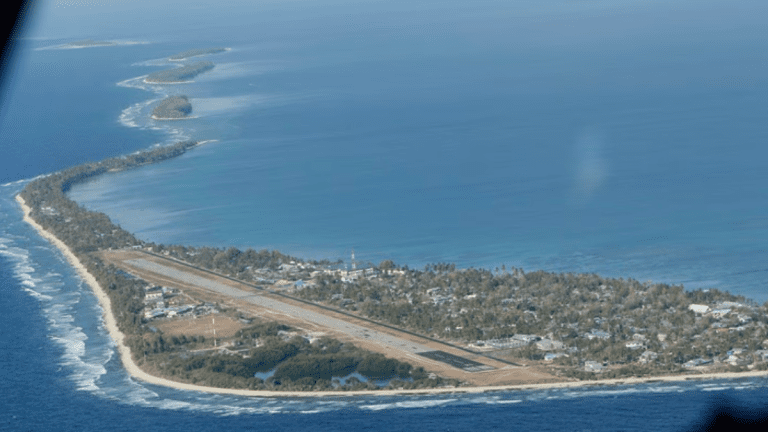
🕒 Last updated on July 3, 2025
Rising Waters Force a Small Nation to Act
Tuvalu is a tiny island country in the Pacific Ocean. It has only about 10,000 people living across nine coral islands. These islands are flat and low, barely above sea level. That makes Tuvalu one of the most vulnerable countries in the world to climate change.
Now, sea levels are rising fast. The ocean is creeping onto the land. Saltwater is entering the wells, and clean drinking water is becoming harder to find. During high tides, the waves come close to flooding the capital, Funafuti. Some experts say future tides may cover almost the entire city.
The country’s only airport also sits dangerously close to sea level. If sea levels continue to rise, even everyday activities could become impossible. Most Tuvaluans live on Funafuti, and they are seeing these changes happen in real time. The locals are concerned because the land is disappearing.
Australia Offers a New Type of Visa
A new immigration program has been established by Australia in response to these pressing issues. It is called a “climate visa.” It allows Tuvalu citizens to move to Australia permanently. They can live, work, or study there.
Australia launched the visa lottery last week. In just a few days, nearly half of Tuvalu’s population applied. That’s about 5,000 people hoping to leave their country. This shows how serious the situation has become.
$368 billion mistake? Growing fears AUKUS submarine deal could sink Australia’s sovereignty
The special visa allows 280 Tuvaluans to move each year. At that rate, it would take 40 years for all citizens to relocate. The visa is part of a deal between the two countries called the Falepili Union Treaty. This agreement also promises Australia’s help in building sea walls and reclaiming land.
However, both nations avoid saying that Tuvalu might disappear. They focus on protecting its identity, even if people must leave the land behind.
More Than Just Climate Concerns
The visa deal is not only about rising waters. It also involves global politics. Tuvalu is one of the few countries that still support Taiwan’s independence. China wants Pacific nations to drop that support.
Australia sees Tuvalu as an important ally. So, the visa agreement includes a rule: Tuvalu cannot make security deals with other countries unless Australia agrees. In return, Australia is helping Tuvalu with climate projects, like building stronger coastlines and reclaiming land near Funafuti.
Millions of dollars are being spent to support Tuvalu’s Coastal Adaptation Project. This aims to create more safe space for homes and important buildings. It’s an attempt to buy time, even if the sea continues to rise.
The contrast between countries is clear. While Australia is welcoming Tuvalu citizens, some other countries are not. One powerful country is even thinking of banning Tuvalu from entering. No clear reason has been given for this possible travel restriction.
A Nation on the Edge of Displacement
The people of Tuvalu are in a very unusual situation. They are not being pushed out by war or violence. Instead, they face a threat from nature. Their land is slowly becoming unlivable due to climate change.
This makes Tuvalu a rare case. The world has seen refugees before, but not climate refugees on this scale. The ocean isn’t just destroying homes; it is also taking away a country’s future.
Still, Tuvalu’s leaders are trying to make sure their country’s name and culture survive. Even if many people leave, they want to remain a nation.
In a strong move, Tuvalu and other Pacific island nations have joined together. They are calling for the world to stop using fossil fuels, which heat up the planet. Tuvalu is also trying to stop using these fuels in its own communities.
People from Tuvalu are using every tool they can. They are applying for visas, speaking out, and working with larger nations. Their goal is to stay safe and protect their island identity for as long as possible.
The rush to apply for the climate visa shows how serious the situation is. Nearly half of Tuvalu’s people want to leave, not because they want to, but because they must. The land that once gave them life may soon be lost to the sea.